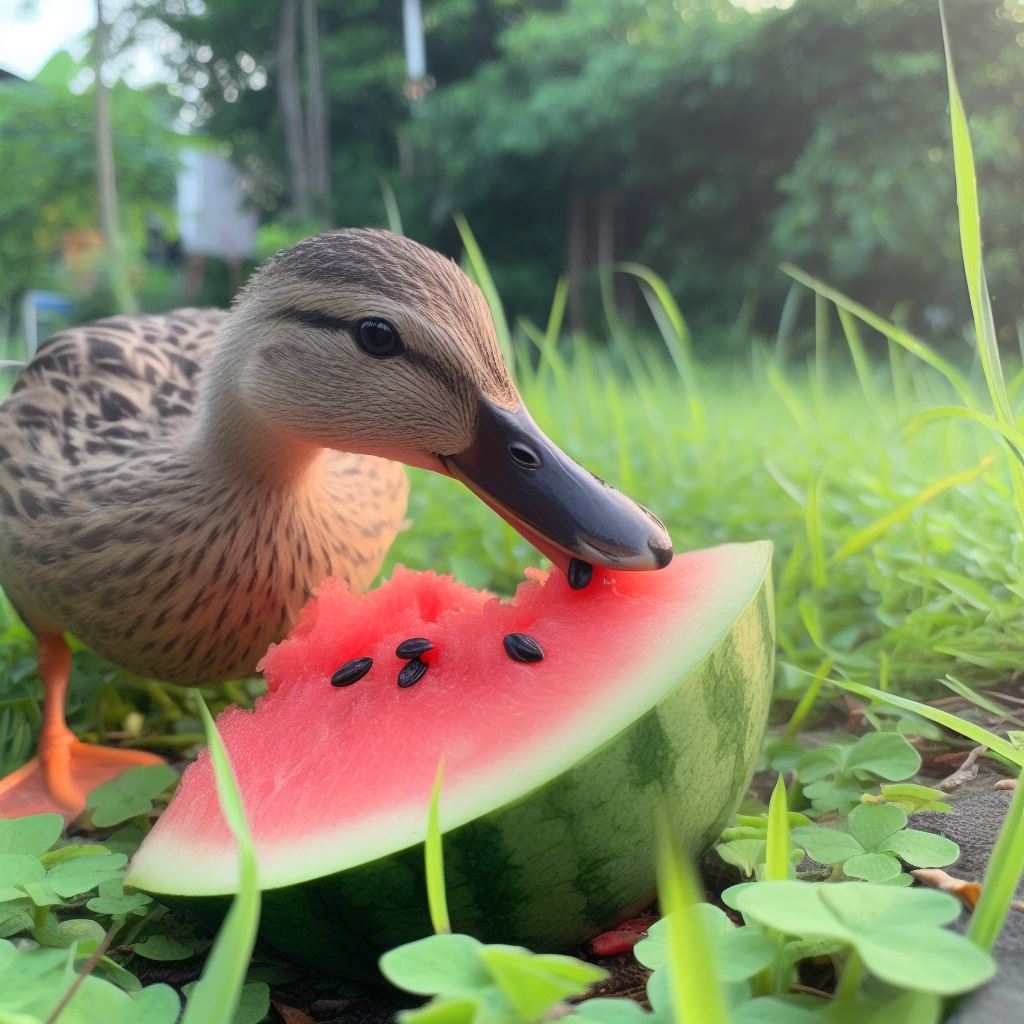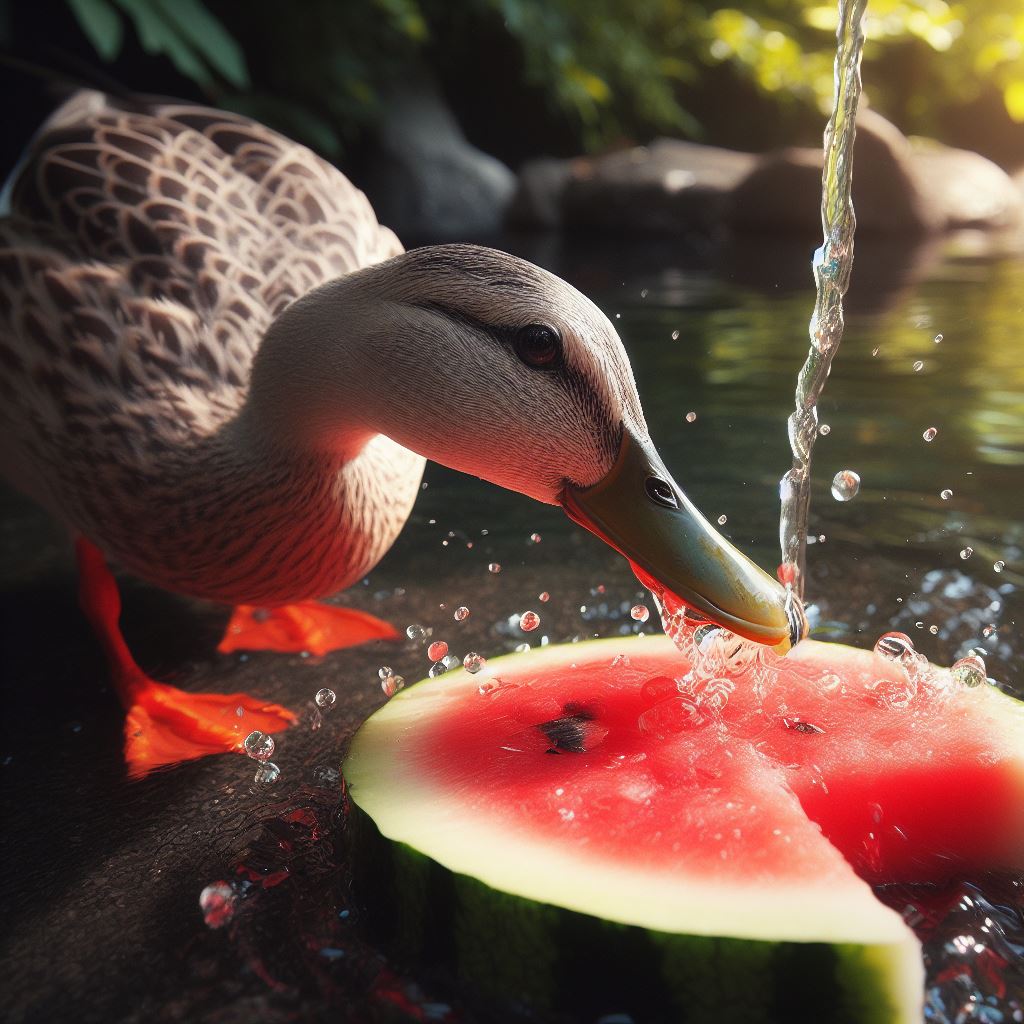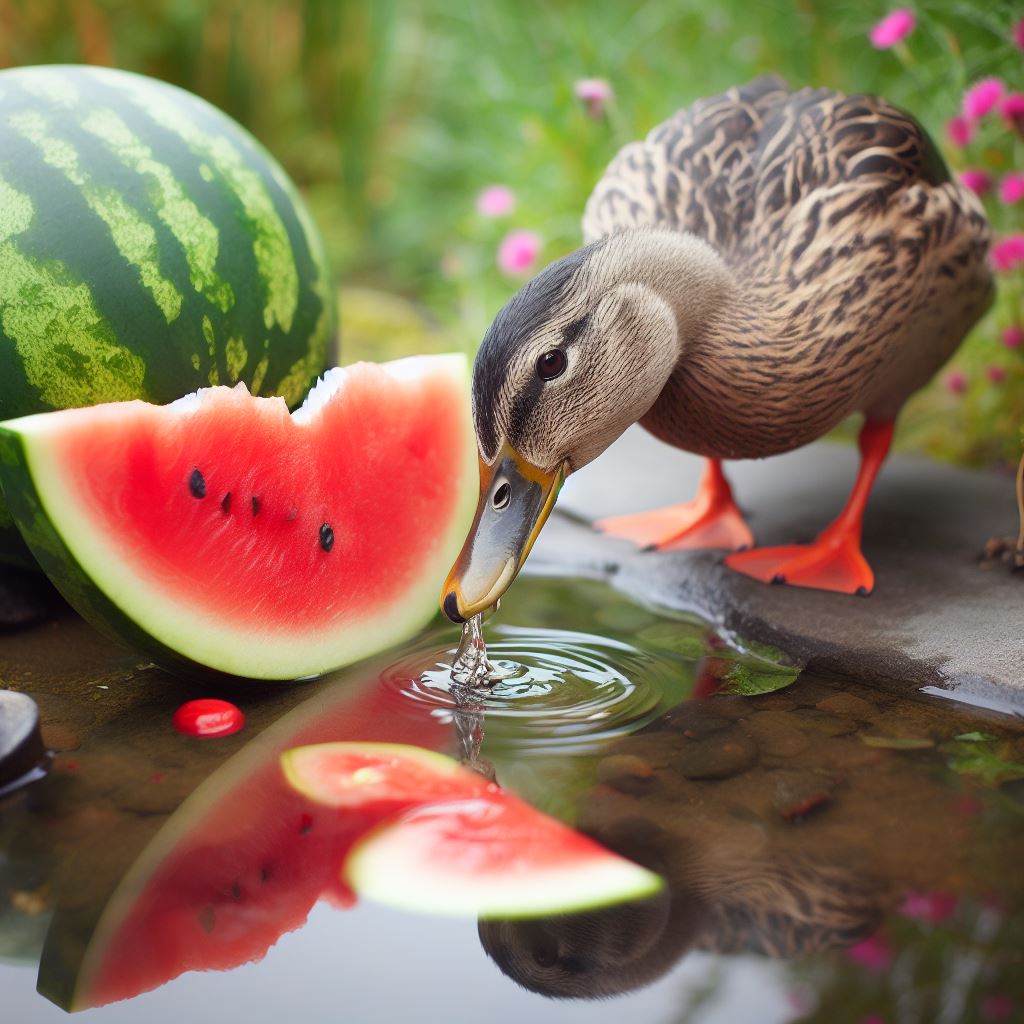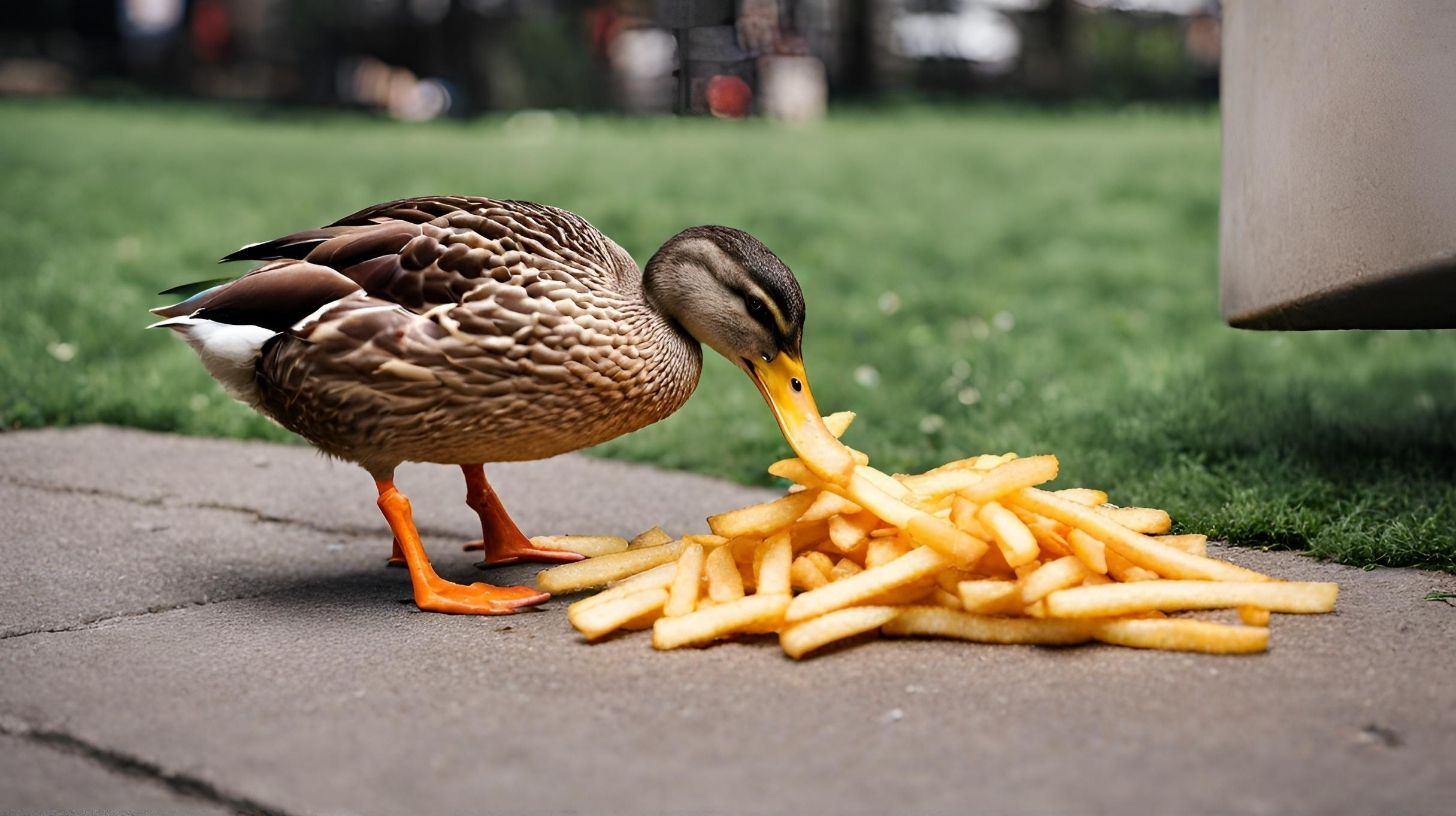Can Ducks Eat Watermelon? Benefits, Risks and Feeding Tips

Table of content:
- An Overview: Can Ducks Have Watermelon?
- Is Watermelon Good For Ducks? Benefits and Drawbacks
- Are Watermelon Rinds Safe For Ducks to Eat?
- Are Watermelon Seeds Safe For Ducks? Can They Eat Them?
- How Much Watermelon Should You Feed Ducks? Avoid Overfeeding
- How to Prepare Watermelon for Ducks
- What Other Fruits Can Ducks Eat?
- Frequently Asked Questions About Ducks Eating Watermelon
- Conclusion
Can ducks eat watermelon? Watermelon can be a tasty, hydrating snack for humans on a hot summer day. But is it safe and healthy for our feathered friends as well? As a duck owner, you likely want to share summer’s bounty with your pets. However, it’s important to understand the implications of offering watermelon and other fruits to ducks before including it in their diet.
This comprehensive guide provides key information to help duck owners make informed decisions about feeding watermelon to ducks.
Key Takeaways:
- Watermelon can be fed to ducks in moderation as an occasional treat. Both the flesh and rinds are safe for ducks to consume.
- Watermelon provides hydration and some nutritional benefits to ducks. However, it lacks key protein and nutrients that should make up the bulk of a duck’s diet.
- Overfeeding watermelon can cause digestive issues and diarrhea in ducks. It’s best to offer it in limited quantities.
- Rinse watermelon to remove pesticide residues, and remove seeds that can pose a choking hazard. Monitor ducks when feeding watermelon to prevent choking.
- Watermelon should never make up more than 10% of a duck’s total food intake. A variety of foods is essential to meet a duck’s nutritional requirements.
An Overview: Can Ducks Have Watermelon?
Watermelon (Citrullus lanatus) is a sweet, juicy summer fruit enjoyed by humans worldwide. Given ducks’ penchant for fresh fruits and vegetables, you may be wondering if sharing watermelon with ducks is possible or safe.
The short answer is yes, ducks can eat watermelon in moderation. Both the flesh and rinds of watermelon are perfectly fine for ducks to consume.
Watermelon is non-toxic to ducks. The fruit contains high water content and some nutritional benefits. As such, it can be offered to ducks as an occasional treat during summertime.
However, there are some important caveats. Watermelon lacks key protein and nutrients ducks need in their regular diet. Overdoing it on watermelon can cause digestive upset in ducks. And seeds pose a potential choking hazard.
By understanding proper portion sizes, preparation methods, and precautions, duck owners can safely incorporate watermelon into their feeding regimen. When fed responsibly, watermelon can be refreshing, hydrating snack ducks go quackers over!
 Is Watermelon Good For Ducks? Benefits and Drawbacks
Is Watermelon Good For Ducks? Benefits and Drawbacks
Before offering any new food to ducks, it’s wise to understand the potential benefits and drawbacks involved:
Benefits of watermelon for ducks:
- Hydration – Watermelon is over 90% water, providing excellent hydration on hot days. This can be beneficial for ducks.
- Fiber – Watermelon contains some fiber from the flesh and rinds, which aids duck digestive health.
- Vitamins and minerals – Watermelon provides small amounts of vitamins A, C and B-6, plus potassium and magnesium. These support duck immunity and health.
- Treat – Watermelon is a sweet, low-fat treat ducks enjoy during summer months.
Drawbacks of watermelon for ducks:
- Low protein – Watermelon lacks the protein content ducks need in their regular diet. It cannot substitute for high-protein foods like insects, fish and birdseed/pellets.
- Low nutrients – While watermelon provides some vitamins and minerals, the amounts are not significant enough to benefit ducks in any major way.
- High sugar – Excessive sugar from fruit can cause diarrhea in ducks. Too much can be harmful.
- Choking risk – Watermelon seeds and rinds may pose a choking risk to ducks if swallowed whole.
So in summary, watermelon makes a nice supplemental treat for ducks to enjoy. But it should never make up a large part of a duck’s diet due to the drawbacks above. Moderation is key!
Are Watermelon Rinds Safe For Ducks to Eat?
Another common question is whether watermelon rinds are safe for ducks to consume. The answer is yes, ducks can safely eat both the juicy red flesh and the green rind of watermelon.
In fact, some bird owners specifically favor feeding the rind to their ducks. Since it contains higher fiber than the flesh, it can aid digestion. The rind also contains small amounts of nutrients like vitamin C.
There are two precautions to note regarding watermelon rinds:
1. Choking hazard – When feeding the rind, be sure to slice it into manageable bite-sized pieces. Large chunks of rind can pose a choking risk to ducks.
2. Pesticides – To minimize ingestion of pesticides, thoroughly wash rinds and remove the outer thick green layer of the skin when possible.
As long as these two factors are addressed, watermelon rinds can be safely enjoyed by ducks. The high fiber content makes it an especially beneficial part of the fruit for ducks to eat.
Are Watermelon Seeds Safe For Ducks? Can They Eat Them?
Inside every watermelon are numerous black seeds, so it’s natural to wonder if ducks can safely consume them.
The answer is ducks can eat a small number of watermelon seeds safely, but caution is advised.
Watermelon seeds can remain intact when chewed. If swallowed whole, the seeds may pose a potential choking hazard or cause intestinal blockage.
For this reason, it’s best to remove the seeds from watermelon flesh before feeding it to ducks. If a few seeds are accidentally ingested, it’s unlikely to cause problems. But ducks should not be allowed to eat excessive quantities of seeds.
If you do opt to feed seeds, crush them thoroughly and mix them into watermelon flesh to minimize risks. Monitor your ducks closely afterward to ensure the seeds pass safely through their digestive tracts.
 How Much Watermelon Should You Feed Ducks? Avoid Overfeeding
How Much Watermelon Should You Feed Ducks? Avoid Overfeeding
When offering any fruit treat to ducks, moderation is key.
As a general rule, no more than 10% of a duck’s daily food intake should come from fruit like watermelon. The bulk of their diet – approximately 85% to 90% – should be a nutritionally balanced duck feed or bird seed. The remainder should come from healthy treats like greens, vegetables, berries and occasional fruit like melon.
For an average adult duck, here are some general watermelon feeding guidelines:
- Up to 1 cup of diced watermelon per day is an appropriate amount for most ducks. Adjust quantities based on the size of your duck.
- Feed watermelon no more than 2-3 times per week during summer months when the fruit is in season.
- Avoid feeding exclusively watermelon. Combine it with healthy duck foods and various treats to provide balanced nutrition.
- Monitor duck droppings after feeding watermelon. Loose droppings or diarrhea can indicate overfeeding.
- Discontinue watermelon if any signs of digestive upset occur and consult your avian vet.
Sticking to moderate quantities and proper frequencies will allow ducks to enjoy watermelon safely as part of a varied diet. Be sure to adjust amounts to your ducks’ individual needs.
How to Prepare Watermelon for Ducks
Before serving watermelon, take a few simple precautions in its preparation:
- Rinse thoroughly under water – This removes bacteria and minimizes pesticide residue left on the rind.
- Cut into bite-sized pieces – Duck beaks cannot easily open large melons. Dice into 1/2 to 1 inch cubes.
- Remove all seeds – Discard seeds or crush them thoroughly before mixing into flesh. This reduces choking risk.
- Purchasing tips – Choose ripe, undamaged melons. Overripe melons draw pests and can make ducks sick. Underripe melons are hard to digest.
Feeding watermelon can be a safe, enjoyable activity for both you and your ducks when these best practices are followed!
What Other Fruits Can Ducks Eat?
Watermelon is just one of many great fruit options duck owners can share with their pets. Here are some other fruits ducks enjoy:
- Berries – Raspberries, blackberries and strawberries. Offer in moderation due to sugar content.
- Citrus fruits – Oranges, tangerines, clementines. Provide segmented fruits, not juice, to avoid sticky feathers.
- Apples – A classic duck favorite. Core and slice first.
- Grapes – Halved or quartered to prevent choking. Avoid raisins which are too high in sugar.
- Bananas – Rich in potassium. Mash before feeding as whole bananas can choke ducks.
- Cantaloupe – Similar feeding guidelines as watermelon. Opt for small amounts of fresh cut melon pieces.
Fruit should comprise no more than 10% of a duck’s diet. Always introduce new foods slowly and watch for any adverse reactions. Consult your vet for any duck health concerns.
Frequently Asked Questions About Ducks Eating Watermelon
New duck owners often have several other common questions about sharing watermelon. Here are answers to some frequently asked questions:
Can I feed watermelon rinds and seeds to wild ducks?
It’s best not to feed wild ducks people food like watermelon. Their digestive systems are not accustomed to it. If you opt to offer natural treats like greens, grains or mealworms, provide them only in limited quantities.
How many times a week can ducks eat watermelon?
2-3 times per week is appropriate during summer when watermelon is in season. Any more frequent risks of overfeeding.
Do muscovy ducks, call ducks, Pekin ducks and wild ducks all enjoy watermelon?
Yes, all breeds of domestic and wild ducks have a fondness for sweet fruits like watermelon and cantaloupe as an occasional summer treat in moderation. Their natural foraging behaviors draw them to such foods.
Can ducklings eat watermelon?
While ducklings under 4 weeks old should not eat watermelon, young ducks over 1 month old can start enjoying small amounts of prepared melon flesh (no rinds or seeds) 2-3 times weekly with supervision.
What does it mean if my duck’s poop is loose after eating watermelon?
Occasional loose droppings immediately after feeding watermelon are not unusual. However, if diarrhea persists, reduce or discontinue melon to avoid health issues. Consult your vet for any digestive concerns.
Conclusion
In the summertime, juicy watermelon slices are hard for ducks to resist! When fed responsibly, watermelon can provide hydration, nutrition and enrichment to ducks during hot months.
By following the feeding tips, precautions, and portion guidelines in this guide, duck owners can safely incorporate watermelon into their ducks’ diets. Be sure to introduce new foods slowly, never overfeed fruit, and provide a nutritionally balanced primary diet.
While watermelon shouldn’t become a duck’s main food source, it makes for a fun seasonal snack when precautions are taken. So kick back and enjoy sharing some sweet, refreshing watermelon with your feathered friends this summer!
Welcome. I’m Adreena Shanum, the proud owner of this website, and I am incredibly passionate about animals, especially poultry. I founded adreenapets.com as a labor of love, stemming from my desire to share my knowledge and experiences with poultry enthusiasts worldwide.




